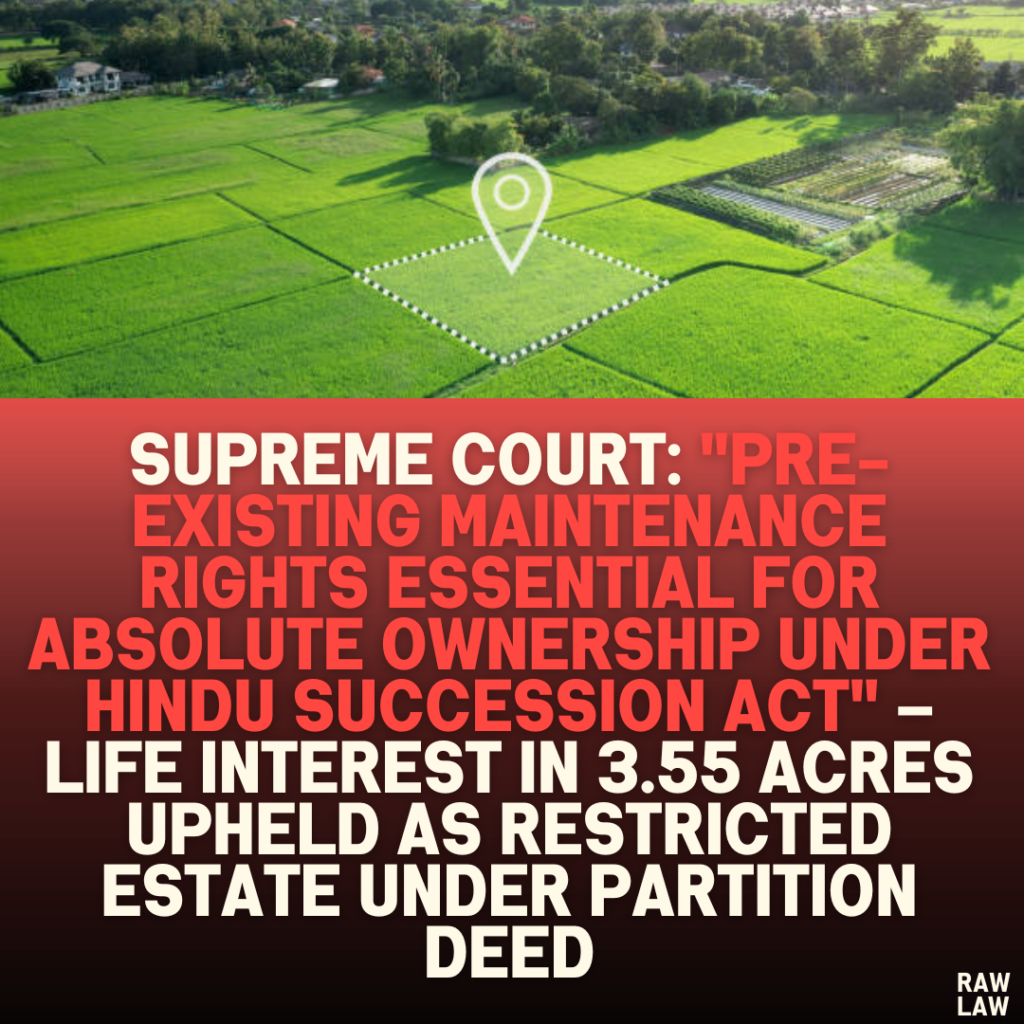Court’s Decision:
The Supreme Court dismissed the appeal filed by the appellant-defendants, thereby affirming the concurrent decisions of the Trial Court and the High Court. It held that Veerabhadramma, the stepmother of the respondents, only held a restricted life interest in the 3.55 acres of land as per the 1933 partition deed. Her rights to this property did not expand into absolute ownership under Section 14(1) of the Hindu Succession Act, 1956. Consequently, the property was to be divided equally between the two branches of the family after her death.
Facts:
- The case revolved around property succession between two branches of the same family, specifically involving stepbrothers.
- The disputed property, 3.55 acres of agricultural land, was outlined in a partition deed executed in 1933. As per the deed:
- The property was to be enjoyed by Veerabhadramma (the second wife of Kallakuri Swamy) during her lifetime.
- Upon her death, the property would devolve equally to the successors of Kallakuri Swamy’s first and second marriages.
- Veerabhadramma passed away in 1973. The respondents alleged that the appellants obstructed their lawful share in the property and used a will executed by Veerabhadramma to assert exclusive ownership.
- The respondents filed a suit in 1984 seeking partition and declaration of their rightful share.
Issues:
- Section 14(1) vs. Section 14(2): Whether the disputed property, given to Veerabhadramma under the 1933 partition deed, vested in her as absolute property under Section 14(1) of the Hindu Succession Act, 1956, or remained a restricted estate under Section 14(2).
- Right to Partition: Whether the respondents, as successors, were entitled to claim an equal share in the property after her death.
Petitioner’s Arguments:
- The appellants argued that Veerabhadramma’s restricted life interest under the partition deed expanded into absolute ownership after the enactment of Section 14(1) of the Hindu Succession Act, 1956.
- They claimed that this transformation allowed her to execute a valid will, bequeathing the property to them exclusively.
Respondent’s Arguments:
- The respondents contended that the 1933 partition deed explicitly limited Veerabhadramma’s rights to a life interest, leaving no scope for absolute ownership.
- They asserted that Section 14(2) of the Hindu Succession Act, 1956, applied to this property, maintaining the restricted estate, and preventing the creation of absolute ownership.
- They sought the court’s intervention to enforce the equal division of the property as stipulated in the deed.
Analysis of the Law:
- Section 14(1), Hindu Succession Act, 1956:
- Converts restricted estates into absolute ownership for female Hindus if the property is possessed in recognition of a pre-existing right (e.g., maintenance).
- This provision aims to eliminate gender discrimination and grant equal rights to female Hindus.
- Section 14(2), Hindu Succession Act, 1956:
- Preserves the restricted nature of property if acquired under a will, partition deed, or other instruments that specifically create a limited estate.
- The section acts as an exception to Section 14(1) and prevents its application where no pre-existing rights exist.
- The court emphasized that Section 14(1) applies only when the property is granted in recognition of pre-existing legal or customary rights to maintenance, not when the instrument explicitly limits the estate.
Precedent Analysis:
- V. Tulsamma v. V. Sesha Reddy (1977):
- Established that properties given in recognition of a woman’s pre-existing right to maintenance under Hindu law transform into absolute ownership under Section 14(1).
- Jaswant Kaur v. Harpal Singh (1989):
- Clarified that Section 14(2) applies when the property is acquired through an instrument that prescribes limited rights, irrespective of maintenance claims.
- Gulwant Kaur v. Mohinder Singh (1987):
- Held that possession of property in lieu of maintenance is sufficient to invoke Section 14(1), provided there is no restrictive clause.
Court’s Reasoning:
- The court examined the language of the 1933 partition deed, which clearly restricted Veerabhadramma’s rights to a life interest in the 3.55 acres of land.
- It differentiated between two categories of property rights:
- Absolute ownership (2.09 acres): Granted to satisfy her pre-existing maintenance rights.
- Restricted estate (3.55 acres): A separate allocation beyond maintenance, limited to her lifetime.
- The court held that:
- The restricted estate of 3.55 acres fell under Section 14(2) due to the explicit language of the partition deed.
- Section 14(1) did not apply because the property was not granted in recognition of maintenance rights but as a new, limited interest.
Conclusion:
The court dismissed the appeal, reaffirming that:
- Veerabhadramma’s rights over the 3.55 acres of land were restricted to her lifetime.
- The property devolved equally upon the two branches of successors after her death, as stipulated in the partition deed.
- The will executed by Veerabhadramma was invalid concerning this property, as she lacked absolute ownership.
Implications:
This judgment underscores the careful distinction between Sections 14(1) and 14(2) of the Hindu Succession Act, 1956:
- It reinforces that pre-existing maintenance rights are necessary to invoke Section 14(1) and convert restricted estates into absolute ownership.
- The decision highlights the importance of the language and intent in partition deeds or similar instruments in determining property rights.
- It provides clarity on the limited scope of Section 14(2), safeguarding the restricted nature of estates created under specific instruments.




Pingback: Bombay High Court Dismisses Lodha Belmondo Federal Society Registration, Emphasizes Harmonizing RERA, MOFA, and MCS Act, Rules Statutory Compliance Must Precede Society Registration to Protect Flat Purchasers and Ensure Orderly Project Development - Raw L
Pingback: Supreme Court Acquits Accused in Brutal Murder Case; Emphasizes Heinousness of Crime Does Not Reduce Prosecution’s Burden to Prove Guilt Beyond Reasonable Doubt - Raw Law